Today it’s all about adding a printer to Windows 8/8.1 and adding/changing your desktop themes. Check out our video on Youtube.
Thanks for reading! Oooops, that should be ‘Thanks for watching!’
Today it’s all about adding a printer to Windows 8/8.1 and adding/changing your desktop themes. Check out our video on Youtube.
Thanks for reading! Oooops, that should be ‘Thanks for watching!’
Well, we did it! Yesterday we installed CamStudio and today we created our first official Computers Made Simple video. It’s short, less than five minutes but we show you how to boot to your desktop, add a PIN to log on to Windows and, best of all, how to shut down your computer.
http://www.youtube.com/watch?v=wSPV_RyHBwU
We will still be writing posts now and then but we’re trying to open up our audience. We will post every new video here, of course, so you won’t miss anything. Speaking of that, why not head over to our Facebook page and click the Like button? That way, you’ll always be on top of our latest posts and videos. Here’s the link to that: Computers Made Simple on Facebook
Thanks for reading! Comments on the video are welcome…just don’t be too critical.
We use CamStudio to record our instruction videos for Youtube. So far we’ve only made one but there will be more n the future. The last time we installed CamStudio, everything went well. We downloaded the software, double clicked on it and that was that. Just now, we were surprised to find adware attached to the main program, even though we downloaded it from the main CamStudio site. Once we saw this, we decided to do a post on how to avoid installing extra software (adware) with some free apps.
1. Once you download CamStudio, and some other software, the installation process starts normally. Usually the first screen asks you to accept the company’s terms of use. That goes for just about everything that you download. That part is easy. Here are the first two screens:
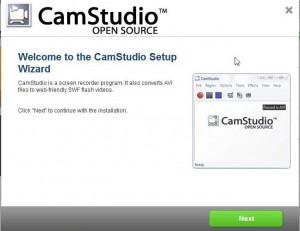
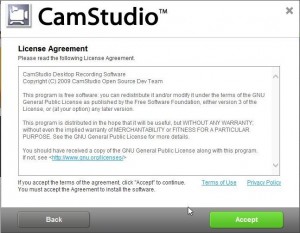
2. Now is the time to start really paying attention. The next several screens look innocent enough but they’re not. Here’s an example:
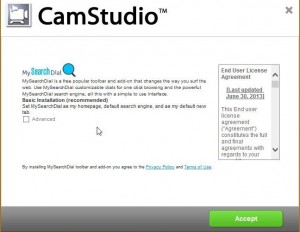
When you click Accept on this screen without clicking ‘Advanced’ first, your home page will change, ‘My Search Dial’ will become your default search engine and any new tab that you open will contain My Search Dial, whatever that is. For now, click on Advanced. This is what you see, carefully hidden behind that box:
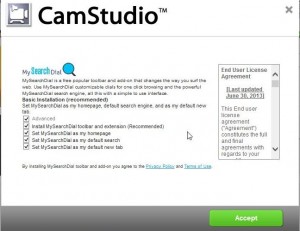
Uncheck the four boxes below Advanced, then click Accept. You want the box to look like this before you click Accept:
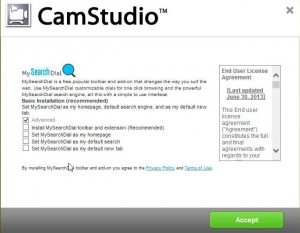
3. On the next few menus, the style has changed. This time, instead of hiding things behind an Advanced button, you will have to ‘Decline’ several options, all of which will install adware on your computer. We’ll run through them as a group, just remember to click Decline on each one.
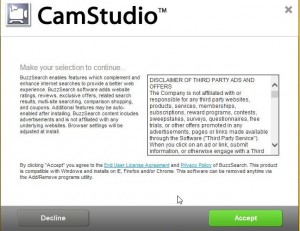
TIP: The adware wants you to think that you are actually declining the whole installation. You’re not. You are simply declining the installation of the adware. Remember that.
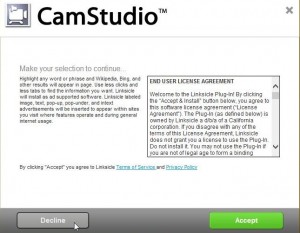
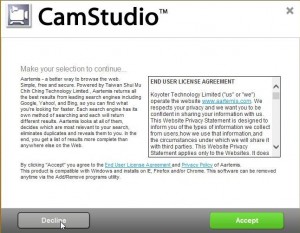
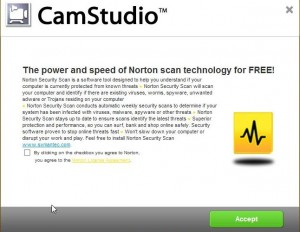
4. CamStudio will now install correctly with no adware (many would call it malware) attached. If you haven’t been keeping track, there were five additional programs that would have been installed if you had simply accepted the default screens. We know the software creators have to make some money for their efforts but we don’t think that adding sneaky bits of adware/malware is the way to do it.
TIP: You may have noticed that we didn’t include a link to the CamStudio site. This post was to show you how to avoid adware that is attached to otherwise free software, not to plug CamStudio. CamStudio works and works well but we don’t agree with the other crap that goes with it.
This is only one example of the things you might encounter with different bits of software, some paid and some free. We do our best to only show links to free software that comes without adware. If you notice something that we’ve linked to that comes with adware, please let us know.
Thanks for reading!
Windows 8 has made the simple task of turning off your computer into something substantially more frustrating. Microsoft is pushing its tablets, of course, having stepped into the hardware world lately. Tablets shut off with the push of a button, at least they go to sleep that way. For the rest of us who use laptops and desktops, finding the shutdown menu can be very irritating. Here’s where it is:
1. If you’ve installed the 8.1 update, you can get a desktop view, something very similar to the older versions of Windows. How do you do that? Right click on a blank section of your taskbar, choose Properties then click on the Navigation tab on the menu that comes up. Choose “Show my desktop background on Start”. Like this:
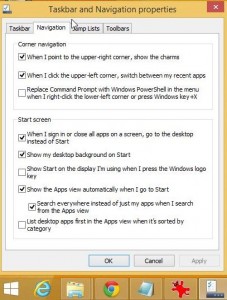
2. So where is the Shut Down switch? Well, it’s carefully hidden behind that little window on the lower left corner of your taskbar. It would make sense that by clicking this window icon you’d have some choices, just like the old versions of Windows. Unfortunately you don’t. All you get is a mass of programs icons. Try right clicking that window and see what happens. Here’s what you get:
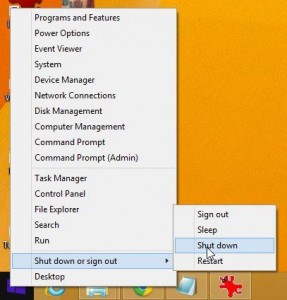
3. You can choose to Shut down your computer or simply Sign out. Sleep is also an option on a desktop. A laptop would have a choice to Hibernate.
There, you found it! Windows 8 is a bit of a mystery, isn’t it? What problems are you having with it? Let us know in a comment or, better yet, Like us on Facebook and ask us there. Here’s the link:
Computers Made Simple on Facebook
Thanks for reading!
We’ve been avoiding this for a while but it’s probably time to do something about Windows 8. If you haven’t guessed yet, we’re not thrilled with it. Here’s why:
1. We don’t see why our email has to be tied to our Windows user account. (We thought this was a pain, and it is, but you don’t have to use a password every time. You can use a four number PIN. More on that later.)
2. Where did the Start menu go? This is something that is just a bit too new for us. We’ve been faithful Windows users since the early ’90s and the Start menu is ingrained in our brains! If we were just starting out on computers it might be different but we’re not. Yes, there are third party apps to get the Start menu back but we don’t think this is a wise idea. We’ll muddle through and sort things out but, right now, this is a problem.
3. Because everything is in a different place, the average user feels lost and very frustrated. Yes, there are instructions as you start to use Windows 8 but taking the time to go through them, let alone remembering them all, is aggravating. For those of us who have the option, it seems better to stick with Windows 7. Sales of Windows 8 seem to reflect our opinion.
Over the next little while we’ll be giving you some tips on Windows 8, little bits of hopefully helpful information that will smooth the transition from Windows 7. Today we’ll show you how to get a PIN number to speed up your log-in routine.
1. Move your cursor (mouse) up to the top right corner of your monitor and let it rest there for a second or two. You should see these images appear on the right side of your screen:
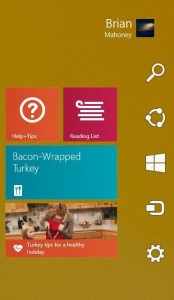
2. You want the gear setting on the bottom. Click it and you’ll see this up next:
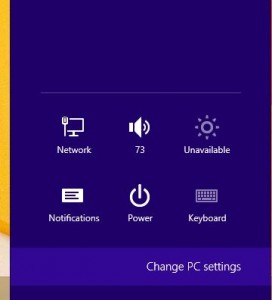
3. Next up comes this:
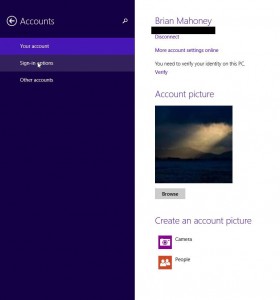
4. Once you get to this section, choose to add a four-digit number (a PIN). You’ll be asked to enter your current password first. Once that is out of the way, enter your PIN twice and you’re all set. Just don’t forget it, OK?
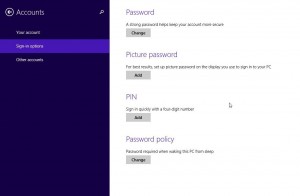
Now that you know your way around the Windows 8 screen a bit, why not experiment? We hope you’ve already upgraded to the free 8.1 version. That update is a bit more user friendly. It seems that Microsoft listened to the objections…finally.
Tell us what you think of Windows 8. Is it yay or nay with you? We’d love to know your thoughts. Comment below or give us a shout on your Facebook page. Here is the link:
Computers Made Simple on Facebook
Thanks for reading!